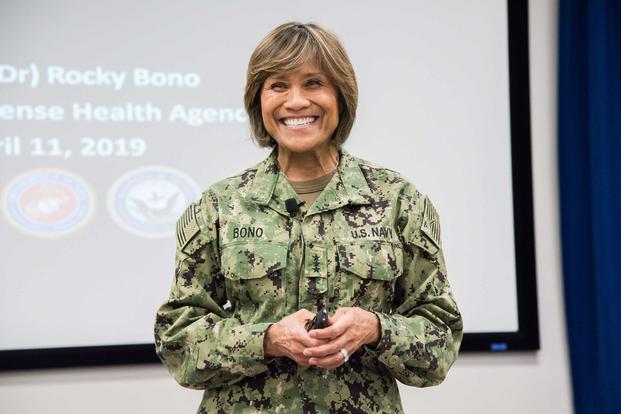When Vice Adm. Raquel Bono became director of the Defense Health Agency in 2015, her to-do list was lengthy. She joined the agency just as the Defense Department invested in a new electronic health records system, established geographic "markets" to support military hospitals and facilities in various regions, and was on the verge of awarding multimillion-dollar contracts for two realigned Tricare regions.
What she didn't foresee -- and what happened within her first 18 months in office -- was the consolidation of Tricare programs and the assignation of all military health facilities to the Defense Health Agency, or DHA, a change that began last October with some facilities in North Carolina, Florida, Mississippi and South Carolina.
Such changes are challenging, Bono told reporters Monday during one of her final interviews in uniform, as she prepares to retire at the end of the month. But she believes DHA management of all 55 military treatment facilities (MTFs) and more than 300 associated clinics will have a positive impact on health care for service members and their families.
"If you look at the [military] housing situation, there was no centralized oversight and it was very much driven by either locality or a particular department's approach to housing. There wasn't a collective or uniform approach. This is the benefit I believe the DHA will bring to military health," she said.
Related content:
- Questions Remain as DoD Gets Ready to Cut 18,000 Medical Personnel
- Services Turn Focus to Warfighters as DHA Takes Over Military Hospitals
Another change coming to the military facilities and Tricare users is an emphasis on quality of care, rather than quantity of services provided.
"Just as we've started measuring the outcomes for our military treatment facilities, that's the expectation we'll also be having for providers participating in the military health system. We'll be asking them to report on their clinical outcomes and how well they're performing against some standardized clinical outcomes," Bono said.
Patients will have more opportunities to see how their military facilities or civilian health providers measure up on hospital comparison websites such as Hospital Compare and Leapfrog, she added.
Bono became DHA director at a time when Tricare regions were being consolidated from three to two; the new electronic health records system, MHS Genesis, reached operational milestones; and Congress debated the future of Tricare.
Under her watch, the Tricare health plans morphed into Tricare Prime and Tricare Select; new fees and an enrollment season were introduced; and retirees got a new dental and vision care program through the Federal Employees Dental and Vision Insurance Program.
"The Defense Health Agency and the military health system [have] been on a journey for some time, trying to find and realize savings and efficiency," Bono said. "We had already started ... bringing shared functions together, already started looking at ways we could modernize.
"The change we didn't expect was that the MTFs would come under the administration and management of the DHA. However, in retrospect, it made a lot of sense because if you recall, the DHA has always been charged with overseeing the Tricare health plan, which was a very large part of our overall health plan," she said. "What the legislation allowed us to do was actually inside the military treatment facilities. In that regard, we were able to see the full range of our services that we deliver to our beneficiaries."
Bono has seen the military health system budget grow from $33.5 billion in 2016 to a proposed $49.5 billion for fiscal 2020. She said as the Defense Health Agency looks ahead, she hopes her successor will keep the momentum "going forward."
"I think the big challenge anybody will have, especially in the DHA writ large, is making sure that we maintain a high level of information-sharing with our senior leadership. Part of the challenge of any change effort is making sure you have a consistent number of informed and engaged leaders."
She said that has remained a challenge because she has worked for six under secretaries of defense for personnel and readiness, only one of whom -- current Veterans Affairs Secretary Robert Wilkie -- was confirmed.
Born in Quezon City, the Philippines, and raised in Texas, Raquel Cruz Bono is a trained surgeon who earned her undergraduate degree from the University of Texas and medical degree from Texas Tech University. During Operations Desert Shield and Desert Storm, she served as head of casualty receiving at Fleet Hospital Five in Saudi Arabia. Other duty stations include general surgery at Naval Medical Center Portsmouth, Virginia; attending surgeon at the Burn Trauma Unit at Sentara Norfolk General Hospital in Virginia; and director of Restorative Care at the National Naval Medical Center, Bethesda, Maryland.
She served as director of the National Capital Region Medical Directorate and the 11th chief of the Navy Medical Corps before being named head of DHA.
Bono declined to say where she would be heading after she retires but said she plans to pursue a position where she will continue to "disrupt health care."
"So much of what I've learned in the military health system has great applicability to the private health care system. ... There are opportunities there," she said.
-- Patricia Kime can be reached at Patricia.Kime@Military.com. Follow her on Twitter at @patriciakime.













